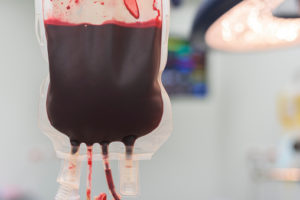Increased cardiac output can aid oxygen delivery in patients with mild anemia. When a critical hemoglobin (Hb) concentration is reached and oxygen delivery is at capacity, more severe anemia can lead to tissue ischemia, organ failure, myocardial infarction, and even death. Little data on the critical hemoglobin threshold is available for patients with comorbidities. In order to investigate the critical hemoglobin concentration in severely anemic patients, researchers conducted a retrospective chart review of registered patients at Duke University Medical Center who refused blood products over a ten-year period. Among 263 hospitalized patients with severe anemia (nadir Hb of 8 g/dL or less), the odds of mortality increased by 55% per 1 g/dL decrease of the nadir Hb (OR, 1.55 [95% CI, 1.25-1.91]; p<0.0001). The risk of myocardial ischemia also increased with decreasing nadir Hb. Untreated severe anemia can become life-threatening, and alternative treatment options could be beneficial for patients who decline transfusions.
Reference:

